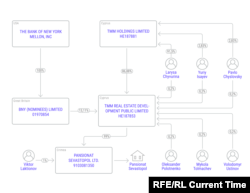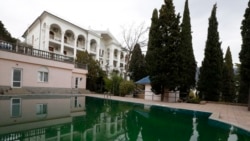A mid-range, no-frills Crimean hotel might not seem the type of investment with an indirect link to one of the world’s largest custodian banks, BNY Mellon. But the Sevastopol Pansionat, located in Crimea’s resort town of Yalta, is exactly that. The hotel’s financing and ownership raise questions about how effectively EU sanctions against Russia for its 2014 annexation of Crimea are being enforced.
Tricolor Russian flags greet guests at the entrance to the Sevastopol Pansionat hotel in the Crimean resort town of Yalta. Once a sanatorium, the balconied, three-building complex, facing the Black Sea and fronted by towering pine trees, looks like an ordinary Crimean spa. But, in reality, it is an investment by a European Union company that could prove a violation of international sanctions.
In 2014, the year Russia annexed the Crimean Peninsula from Ukraine, the European Union introduced sanctions that prohibit EU-registered companies from opening new businesses or investing in Crimea’s tourist industry.
But those restrictions appear to have been interpreted differently by the Sevastopol Pansionat’s penultimate owner, the Cyprus-registered TMM Real Estate Development PLC, a holding company traded on Germany’s Frankfurt and Stuttgart Stock Exchanges.
TMM Real Estate Development’s Kyiv-based subsidiary, TMM, is a company that builds “middle and upper end” residences as well as office towers and industrial facilities in the Ukrainian capital and other major Ukrainian cities. Among the completed projects on TMM’s site is one TMM-Yalta Hotel; a facility that resembles the Sevastopol Pansionat.
Russian registry records show that TMM Real Estate Development founded the Sevastopol Pansionat’s direct owner, Pansionat Sevastopol, Ltd., in Yalta on August 17, 2016. (Companies registered in Crimea are now included in Russia’s State Registry of Legal Entities.) The Cyprus firm invested almost $1.2 million into the hotel company that same year, according to the registry.
That was more than two years after EU sanctions went into effect.
Asked by Current Time about TMM Real Estate Development’s Crimea investment, Deputy Chief Executive Officer Yuriy Isayev, who oversees legal issues, and Chief Financial Officer Larysa Chyvurina instead focused their response on the company’s Ukrainian subsidiary, TMM.
They denied that this Kyiv-based company is doing any business in Crimea.
“The Ukrainian company violates neither the European Union’s sanctions, nor Ukraine’s sanctions related to conducting business in Russia,” Isayev asserted. “We’re not running a business.”
But the Sevastopol Pansionat is clearly in business.
The hotel’s site invites potential guests to make reservations via a yalta.tmm Gmail address.
During Crimea’s peak summer season, a two-person room at the Sevastopol hotel cost, on average, 6,000 rubles ($94.26).
Visitors have ranked the facility a 2.5 out of 10 on the travel-advice-and-booking site Tripadvisor.ru. The most recent comment, from September 2019, complains about a water shutdown and lack of housekeeping services.
Isayev and Chyvurina acknowledged that the hotel’s owner, Pansionat Sevastopol, Ltd., belongs to the TMM Real Estate Development PLC, a company in which they are both minority shareholders.
TMM Real Estate Development owns 99 percent of Pansionat Sevastopol. Viktor Laktionov, the general director of another Crimean company, TMM-Yalta, owns the remaining 1 percent. He could not be reached for comment.
Isayev and Chyvurina stated that they had had to open Pansionat Sevastopol to preserve TMM’s real estate in Crimea after Russia’s 2014 annexation of the peninsula.
From 2002-2015, TMM held the business license for the TMM-Yalta Hotel, the Sevastopol hotel’s doppelganger. (Some booking sites refer to the Sevastopol hotel as the TMM-Yalta.)
But both executives stressed that they do not consider that the Sevastopol hotel’s new owner, Pansionat Sevastopol, Ltd., is violating international sanctions.
TMM Real Estate Development’s share of the company has only a “corporate function,” they said. They did not elaborate about their meaning.
They did not respond when Current Time showed them Russian registry documents about the Pansionat Sevastopol, Ltd.’s registration and initial financing.
Both Isayev and Chyvurina serve on the board of TMM Real Estate Development. Whether or not they discussed with other board members the decision to open a company in Crimea after international sanctions went into effect is not known.
When the Crimean hotel company was registered in August 2016, TMM Real Estate Development’s board included individuals with strong ties to the international finance industry and with work experience in Russia:
- Maarten van den Belt, a Dutch finance specialist who formerly oversaw Wermuth Asset Management’s Russian investments and also managed VISA International’s operations in Russia;
- Dominic Dreyfus, a British banker who is a board member of FBME Bank, which operates in Russia, among other locations. He also is chairman of the British & American Investment Trust’s audit committee. Dreyfus formerly worked as chairman of a Russia-based investment company, AppleGreen.
- Nikoloz Enukidze, the current chairman of Georgia’s TBC Bank Group PLC, one of the South Caucasus’ largest retail bank chains. Enukidze helped take the Bank of Georgia public on the London Stock Exchange in 2006. He has worked for the Dutch bank ABN Amro in Moscow.
In terms of ownership, TMM Real Estate Development is primarily a TMM-centric company. Its largest shareholder (87 percent) is another EU company with TMM officeholders: the Cyprus-registered TMM Holdings, nearly entirely owned by Chyvurina.
TMM Real Estate Development’s largest minority shareholder, BNY (Nominees) Limited, is a dormant British investment firm whose ultimate parent is the New-York-City-based Bank of New York (BNY) Mellon Corporation, one of the world’s largest financial services operations, with $35.8 trillion in custodial and/or administrative assets, and another $1.9 trillion in managed assets.
BNY Mellon Associate Director for Corporate Communications Sorrel Beynon confirmed to Current Time that, among these assets, the company holds a 13.11-percent stake in TMM Real Estate Development on behalf of a client. He did not identify the client.
Beynon did not address how the company views TMM Real Estate Development’s hotel business in Crimea.
“We employ rigorous checks and screening to ensure we comply with international and local regulations wherever we hold assets on behalf of clients and, where necessary, raise any concerns with the relevant authorities,” he said in an emailed statement from London.
The European Union relies on member-states for enforcement of its sanctions and investigation of any potential violations.
In Cyprus, where both TMM Real Estate Development and TMM Holdings are registered, an officer in the Finance Ministry’s Directorate of Administration and Finance advised Current Time to speak with the companies themselves about TMM Real Estate Development’s Crimean activities.
The ministry’s Unit for the Implementation of Sanctions in the Financial Sector “convenes as and when required in order to examine cases that fall under its remit,” Economic Officer Costas Constantinides said in an email.
Noting that Cypriot officials fully comply with EU sanctions against Russia, he stated that the Unit informs police about any suspected violations.
Aside from Cyprus, the United Kingdom is the other EU member relevant to the Crimean hotel case. TMM Real Estate Development’s largest minority shareholder, BNY (Nominees) Limited, is registered in the UK. But whether share ownership alone could subject a UK company to penalties for an EU sanctions violation was unclear.
In April 2019, Current Time contacted the British Treasury’s Office of Financial Sanctions Implementation for clarification, but has not received a response.
In general, European sanctions regulations “are often quite broad and also often quite difficult to interpret,” commented Maya Lester, a London-based Queen’s Counsel who specializes in sanctions law. “And there’s not very much by way of guidance. So, it comes down to lawyers interpreting what they think the language means and what would be a reasonable view of what is prohibited.”
Similarly, in the United States, where BNY (Nominees) Limited’s ultimate U.S. parent, the BNY Mellon Corporation, is registered, whether or not a business would be seen as violating Crimean sanctions depends on the case and the terms of the relationship between parent and subsidiary.
“It’s very fact-specific, so I cannot exactly say ‘Yes, this is a violation’ or ‘No, it’s not,’” said Erich Ferrari, a Washington, D.C. attorney an attorney specializing in U.S. economic sanctions. That determination would fall to the U.S. Treasury Department’s Office of Foreign Assets Control (OFAC), which monitors and imposes sanctions in the United States, he added.
Current Time’s request for information from the OFAC went unanswered.
BNY (Nominees) Limited is the only non-TMM shareholder in the TMM Real Estate Development company. The remaining minority shareholders are all company executives: CEO Mykola Tolmachev, Deputy CEO Yuriy Isayev, Chief Financial Officer Larysa Chyvurina, TMM Kyiv Director Pavlo Chyslovsky, TMM Kharkiv Director Oleksander Polotnenko, and Chief Engineer Volodymyr Ustinov.
-Written by Current Time English editor Elizabeth Owen based on reporting by Kristina Zakurdaeva and Mikhail Maglov
Read The Original Russian Story: Лига санкции







